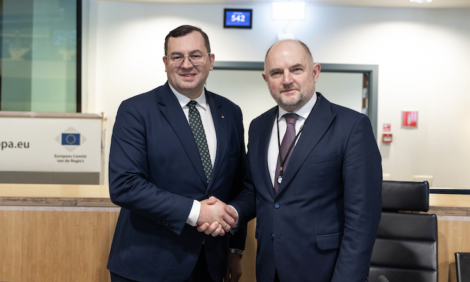



NPPC Questions Need for EPA Reporting Rule
US - While questioning the need for the US Environmental Protection Agency's latest proposed Clean Water Act (CWA) reporting rule for large livestock operations, the National Pork Producers Council (NPPC) applauded the agency for at least acknowledging the concerns of livestock producers and for offering options to address them.EPA's proposed Concentrated Animal Feeding Operation (CAFO) Reporting Rule seeks to have CAFOs submit to the agency operational information so it "can more effectively carry out its CAFO permitting programs on a national level and ensure that CAFOs are implementing practices to protect water quality and human health". The information includes basic facility facts, such as contact information, location of a CAFO's production area, permit status, the number and type of animals confined and the number of acres available for land application of manure.
The agency is considering one of two reporting options: 1) require every CAFO to report information to EPA unless states with authorized CWA permitting programs choose to provide it on behalf of the CAFOs in their state; or 2) require CAFOs in 'focus' watersheds that have water quality concerns associated with CAFOs to report information to EPA.
NPPC President Doug Wolf, a pork producer from Lancaster, Wisconsin, said: "We applaud EPA's alternative targeted approach to addressing real water quality issues. This sets the stage for a more open dialogue among stakeholders over where these policies should go."
The proposal was prompted by a May 2010 settlement agreement EPA entered with the Natural Resources Defense Council, Waterkeeper Alliance and the Sierra Club as part of a lawsuit NPPC brought and ultimately won over EPA's 2008 CAFO rule. The 2008 rule required, among other things, that large livestock operations that propose to or that might discharge into waterways obtain CWA permits. On NPPC's suit, a federal court ruled that the CWA requires permits only for operations actually discharging.
Under the settlement agreement, which was developed without the participation of the livestock industry and was not required or ordered by any court – and now the proposed reporting rule – EPA and the environmental groups are seeking to undermine the federal court decision by reclassifying the CWA permit process as simply informational.
Mr Wolf added: "Our government is not supposed to operate through a process of secret settlements. Pork producers decry that settlement agreement as the product of a bad and closed process that improperly attempted to make major policy decision out of the public eye, and this rule is a product of that flawed process."
NPPC and other livestock groups raised concerns about the settlement, including its potential to undermine farm biosecurity that protects the safety of America's food supply, with US Department of Agriculture Secretary, Tom Vilsack, and Department of Homeland Security Secretary, Janet Napolitano, who worked with EPA Administrator, Lisa Jackson, to come up with a rule that acknowledges the concerns and seeks public comment on them.
Despite USDA's and DHS's intervention, the proposed reporting rule is still problematic, said NPPC, presuming, for example, that CAFOs, by nature, discharge pollutants and that, that can be proved through an information collection process.
The EPA proposal will be open for public comment for 60 days after its publication in the Federal Register. For more information about the proposal, click here.






